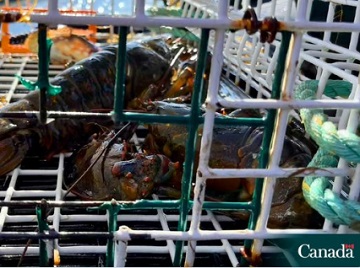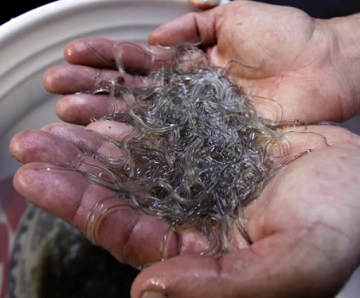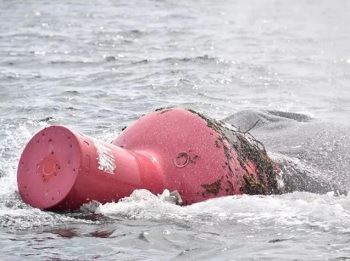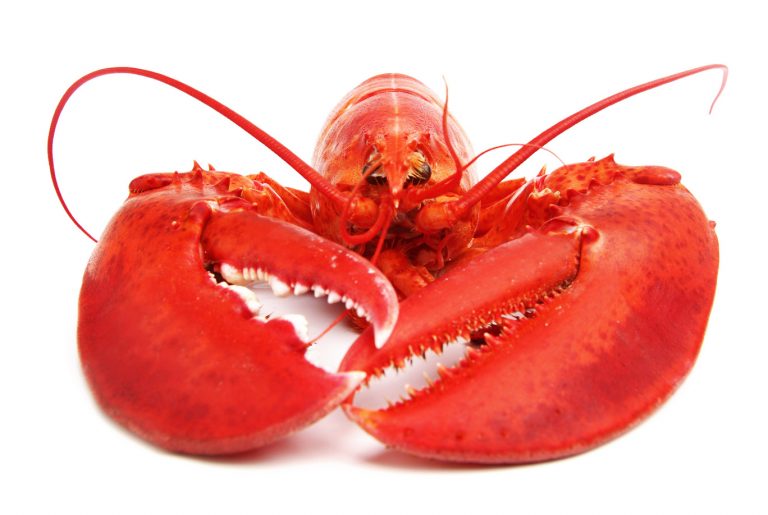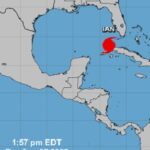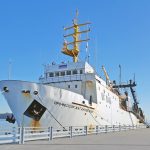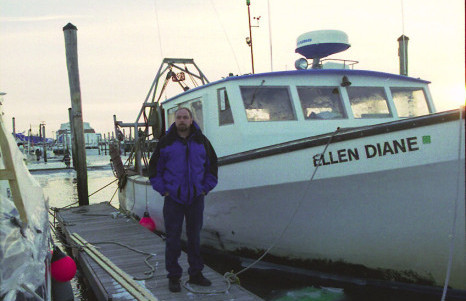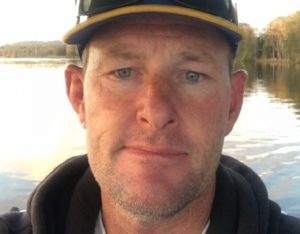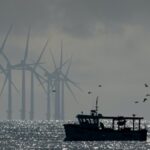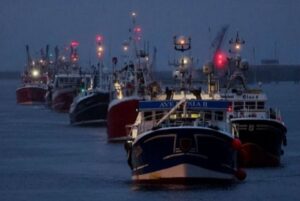Tag Archives: New Brunswick
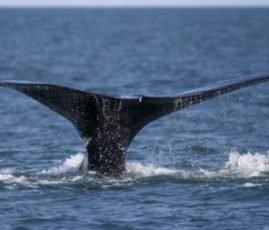
Planes can’t find entangled whale in search Wednesday
Planes and boats searched the Gulf of St. Lawrence on Wednesday, looking for a young North Atlantic right whale entangled in rope and other gear. An airplane saw the calf of a right whale known as 3720 last weekend, 48 nautical miles east of Shippagan, trailing fishing rope and buoys. The Department of Fisheries said at the time that it wasn’t known how long the yearling had been entangled. Whale expert Philip Hamilton of the New England Aquarium said lots of challenges come with finding a whale such as this one, which had previously last been spotted in March off Provincetown, Mass. (Where is the photo of the calf wrapped in fishing gear the plane didn’t take?!!) >click to read< 12:23

Entangled North Atlantic Right Whale spotted off Shippagan, N.B.
The federal Fisheries Department is on the lookout for an entangled North Atlantic Right Whale in the Gulf of St. Lawrence near Shippagan, N.B. The department says the whale was observed on Saturday by a Fisheries and Oceans Canada aircraft. The whale, which has been identified as the 2021 calf of the whale known as 3720, was spotted about 48 nautical miles east of Shippagan. Officials said they do not know the type of gear that the whale is entangled in, or where it came from. >click to read< 08:14
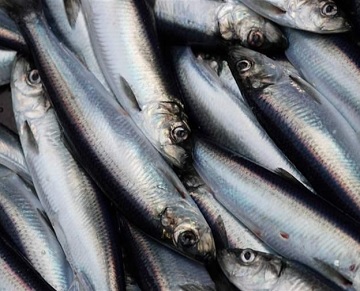
TAC goes from 12,000 to10,000 tonnes – Reduction to herring quota will impact Maritimes, Quebec
The quota for major parts of the herring fishery in the Maritimes and Quebec is being reduced in an effort to increase the stock. The total allowable catch for herring in the southern Gulf of St. Lawrence fishing zone, which includes parts of New Brunswick, Nova Scotia, Quebec and all of Prince Edward Island, is being cut from 12,000 tonnes to 10,000 tonnes. The fall herring stock in the area remains in the “cautious zone,” according to a statement released Friday by Fisheries and Oceans Canada. “The number of spawning adults is declining, and recruitment is at the lowest level ever observed,” DFO said. >click to read< 10:17

Lobster fishermen angry about low prices refuse to fish
About 250 southeastern New Brunswick lobster fishermen gathered outside the new Homarus Centre in Shediac on Thursday after refusing to fish. The fishermen say prices are 40 per cent lower than last year, when they were getting $7 for a pound of lobster. This season, they said, they’re getting $4.50 to $5 a pound, which they say isn’t profitable with the higher expenses they’ve faced because of inflation. Luc Leblanc, the spokesperson from the Maritime Fishermen’s Union said the gathering was peaceful. “The fishermen just wanted to let their feelings known and to make a little bit of a splash, which is what they did.” Geoff Irvine of the Lobster Council Canada said prices are declining because of consumer behaviour and market patterns. >click to read< 18:21
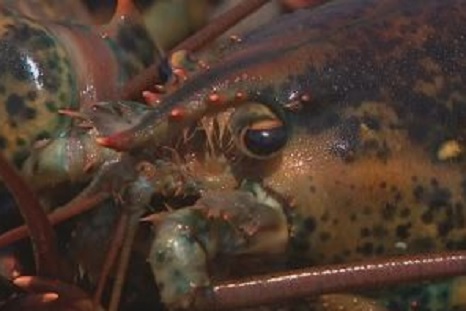
Lobster fishing is not profitable this year, fishermen explain
Rampant inflation and cooling markets are hitting Maritime lobster fishers hard. Six days after the start of fishing in the Northumberland Strait, some of them are receiving a price up to 40% lower than last year for their catch. A fishermen’s organization believes that this is not profitable. The atmosphere was not festive at the Cap-Pelé wharf on Tuesday afternoon. Fishermen have learned what price they will get for lobster this season: between $4.50 and $5 a pound. Last year at this time they were getting $7 a pound. We have prices, but it is not strong. They say it’s blocked everywhere, that lobster doesn’t sell, that’s the reason, explains Captain Guy Cormier. I take it one day at a time, we’re not dead today. >click to read< 07:50

Fisheries report brings hope to Indigenous communities, sparks anger in industry
“I was pleasantly surprised, to be honest,” said Rosalie Francis, a member of the Sipekne’katik First Nation in Nova Scotia. But elsewhere in the province, the surprise has been significantly less pleasant. There are concerns the report titled “Peace on the Water” is instead stoking anger in communities where lobster is a livelihood. Representatives of the commercial fishing industry say they’re frustrated they weren’t invited to speak to the Senate as it drafted the report on Indigenous rights. It’s “throwing fuel on a fire” in an area where tensions have remained high since 2020, said Colin Sproul, president of the Unified Fisheries Conservation Alliance, which has about 1,900 members. >click to read< 12:09
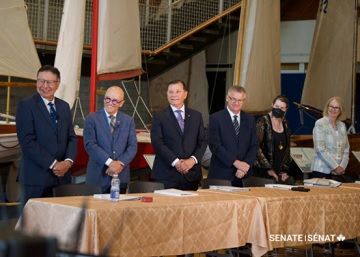
New Report Shows Canadian Government Has Failed Indigenous Fishers
The Standing Senate Committee on Fisheries and Oceans had harsh words for the Canadian federal government. At a meeting this week in Halifax, Nova Scotia, the committee presented its new report, which looked at the implementation of Indigenous rights-based fisheries. Its findings suggest that, despite more than two decades since key precedents were set, the fisheries have not been fully implemented. This has led, the committee stated, to confusion, tension and violence. In Canada’s Atlantic provinces (Nova Scotia, New Brunswick, Prince Edward Island and Newfoundland and Labrador), as well as parts of Quebec, 35 First Nations have a treaty right to fish for a moderate livelihood. >click to read< 14:50
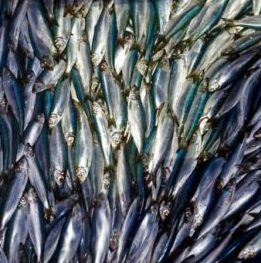
N.S., N.B. herring fishery swallows 33 per cent quota cut
Fisheries and Oceans Canada (DFO) reduced the 2022 quota, or total allowable catch, from 35,000 tonnes to 23,450 tonnes, but environmentalists say the cut does not go far enough to rebuild the stock. The Bay of Fundy Herring Industry said the TAC for this year “will create challenges for industry but is at a level that will help protect jobs, businesses and communities in the region that rely on the fishery.” DFO echoed industry in its announcement, saying its decision was a balance. This decision reduces pressure on this stock, while recognizing the needs of communities that depend on this fishery for jobs and bait,” >click to read< 13:24

Management Plan Released for Atlantic Herring in Southwest Nova Scotia and the Bay of Fundy
Atlantic herring is a vital species in Atlantic Canada. As one of the largest commercial fisheries in Atlantic Canada, the Southwest Nova Scotia / Bay of Fundy herring stock directly or indirectly employs more than 1,000 people in rural Nova Scotia and New Brunswick and contributes over $140 million to the local economy. Atlantic herring is also an important source of bait for other commercial fisheries, such as lobster and snow crab. Despite a number of measures taken in recent years to encourage rebuilding, the Southwest Nova Scotia / Bay of Fundy Atlantic herring stock remains in the critical zone. Stronger sustainable management actions are needed to protect this important species and return it to abundance. >click to read< 13:29
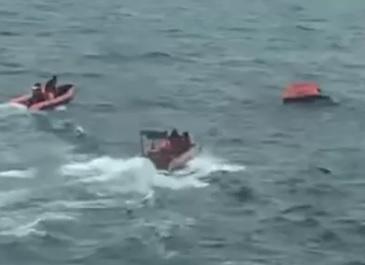
Crew from the Grand Manan Adventure ferry sped to the rescue of fishing crew on a life raft
The Joint Rescue Co-ordination Centre says it got a mayday call from the Ross Pride around noon on Wednesday. The fishing boat was taking on water and listing, said the centre’s Lt.-Cmdr. Brian Owens. “They indicated that they were going to be abandoning their vessel, getting into their life raft,” he said Thursday. Owens said the centre immediately deployed a helicopter and a Hercules aircraft out of Greenwood, N.S. The centre also asked the Canadian Coast Guard station at Westport, N.S., and the United States Coast Guard in Eastport, Maine, to head to the scene. Video, >click to read< 11:25
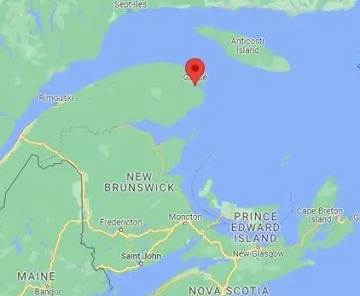
Search underway for entangled North Atlantic right whale spotted in Gulf of St. Lawrence
The whale has been identified as a 14-year-old female, known as Sundog (EG 3823), according to a news release issued Friday. Marine mammal response partners are on standby. “If the whale is located, and weather and sea conditions allow, efforts may be made in the coming days to attempt disentanglement,” the release states. “We do not yet know the type of gear that the whale is entangled in or where the gear came from.” The whale was last seen on March 11, near Cape Cod, Mass. >click to read< 18:09

Another big Maritime fishery quota cut looming
Another Maritime fishery is facing a big quota cut this year. The only question is how big. This time it is the large herring fishery in southwestern Nova Scotia and the Bay of Fundy. The stock is in the critical zone where serious harm is occurring, but the fishery employs hundreds of people in Nova Scotia and New Brunswick. What happens next will again test how far Canada’s fisheries minister is willing to go to rebuild a depleted stock. >click to read< 09:35
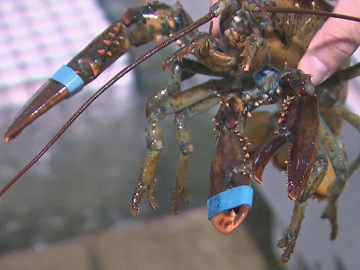
Last lobster season for ‘canners’ – More lobster is the goal
New Brunswick lobster fishermen along the Bay of Chaleur, Acadian Peninsula and Miramichi Bay are setting their traps for the 2022 season Tuesday and this is the last year they’ll be fishing for two different size and price classes. Members of the Maritime Fishermen’s Union in Lobster Fishing Area 23 voted 75 per cent in favour of phasing out the “canner” size, a spokesperson for the group confirmed. Indigenous organizations were also consulted about the change, the Department of Fisheries and Oceans said in a news release. >click to read< 12:30
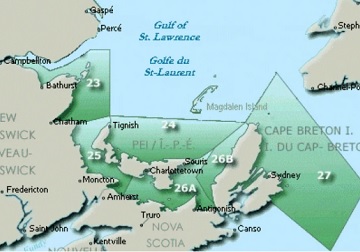
Lobster fishing season in the southern Gulf of St. Lawrence will open on Tuesday
The Department of Fisheries and Oceans announced on Saturday that lobster fishing areas 23, 24, 26A and 26B South will open on May 3 at 6 a.m. That includes areas along the northeastern coast of New Brunswick, the north shore of P.E.I., the western coast of Cape Breton, and part of the Northumberland Strait. The season was supposed to start on Saturday, but earlier this week the DFO postponed the opening due to the weather and the need for dredging at many harbours. >click to read< 19:40
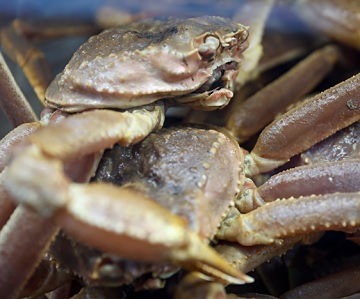
Caspian and Magdalen Islands | Crabs are getting impatient
Although ice crab fishing has been open on the estuary of the St. Lawrence River since March 25, it is long overdue for the grief of crabs in the main fishing area, the Magdalen Islands and the Caspian. The latter wanted to sail on Saturday, at dawn, but Fisheries and Oceans Canada did not grant its approval. The fishing season will finally begin in Zone 12 on Wednesday morning. Why? “For two reasons,” replies Paul Powder, a representative of the traditional crab fishermen of the Magdalen Islands, who has not lost his temper. The first is the presence of ice in some of the New Brunswick ports, which are included in Zone 12, Mr. According to Poutro, “it’s not ice to bother.” But the main reason is that “Coast Guard boats are not ready to monitor the fishery.” >click to read< 20:50
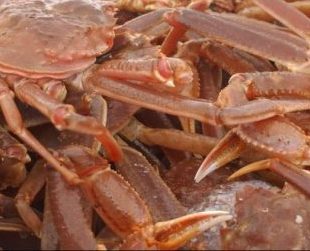
Political pressure for an early opening of the Gulf crab fishery
Quebec urges Ottawa to authorize the opening of the snow crab fishing season as soon as possible in the southern Gulf of St. Lawrence, in which crabbers from the Magdalen Islands, Gaspé and New Brunswick participate. In a letter sent on March 28 to his federal counterpart Joyce Murray, a copy of which was obtained by the QMI Agency, the Quebec minister responsible for fisheries, André Lamontagne, points out that the early opening of the snow crab fishery in the Gulf is, so far, “the most effective adaptation measure that reconciles the protection of Right whales and fishing activities”. >click to read< 10:17
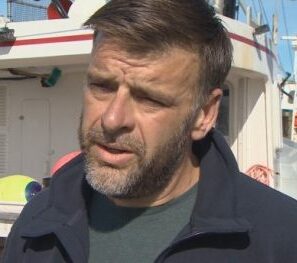
UFCA President Says Important Days Coming In Court
The group representing 2,000 commercial fishing stakeholders in Nova Scotia and New Brunswick have been granted intervener status in several Indigenous court cases. The latest came in December in a notice of application brought forward by the Sipekne’katik First Nation to the Supreme Court of Canada. The band’s application is against the federal government, challenging their regulation and enforcement of Indigenous fisheries. UFCA President Colin Sproul says these are the most vital court cases since the Marshall Decision. He says the UFCA’s goal is to have one set of rules for all fishers, within established seasons, and they are committed to a peaceful solution with all parties involved. >click to read< More UFCA >click< 14:26

DFO Policy Puts Harvester Lives and Livelihoods at Risk
A new ‘weak rope’ gear policy being implemented in Newfoundland and Labrador will have negative implications for fish harvesters in this province, including risks to safety, an unknown cost burden, and significant potential for increased environmental waste. Weak rope measures are being implemented with the goal of preventing right whale entanglements. While these entanglements may be a concern for fisheries in Nova Scotia and New Brunswick, there has never been a right whale entanglement in the Newfoundland and Labrador fishery.,, “The death of one right whale could have a disastrous impact on seafood exports to the United States. Fish harvesters know this and will gladly take all reasonable steps to protect the species and their livelihoods but implementing this policy without any due diligence is entirely unreasonable,” >click to read< 10:55

Category B lobster licence holders still facing 50-year-old punishment
In 1976 DFO created the “moonlighter policy” which was aimed at removing people from the fishery as a conservation method. The result is that it has unfairly targeted fishers who held other jobs or professions almost 50 years ago. DFO deemed fishing was not their primary source of income and they became the “Class B” fishers.,, “It hangs over my head, that when I am gone, I leave nothing to my son. It all goes to the grave with me – boat, traps, licence. This is not fair,” said Clayton Smith of Salmon Beach, N.B. >click to read< 07:45
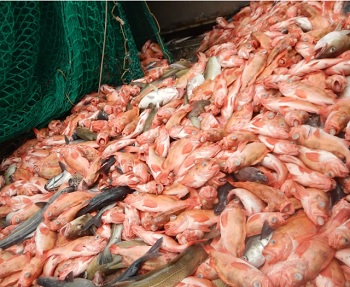
The NLGIDC Supports the Position of an Inshore Fisheries Coalition on the New Redfish Fishery
The Newfoundland and Labrador Groundfish Industry Development Council (NLGIDC) clearly supports the position of a coalition of inshore harvester associations, Indigenous nations, and those involved in seafood processing in Newfoundland & Labrador, Quebec and New Brunswick. This coalition issued a News Release on this important issue on October 14, 2021 that called on the Department of Fisheries and Oceans (DFO) to immediately suspend its consultation process on the rapidly growing redfish resource in the Gulf of St. Lawrence. >click to read< 09:57
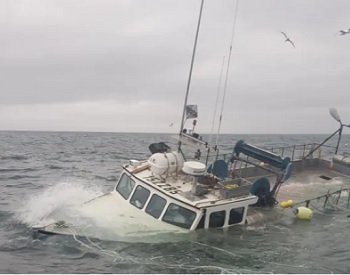
Fishing boat Captain is grateful for the quick response of his fellow fishermen
Élie Dugas, captain of the fishing boat that sank off Miscou on Monday morning, said he’s grateful for the help from fellow fishermen. Within minutes of his distress call at about 6:30 a.m., about eight boats were in sight, ready to help rescue the crew,,, He said he bought the Maximilien two years ago. “It’s a hard blow,” said Dugas, who is based in Miscou and has been fishing for 46 years. Rescuers first tried to pump out the water and then tow the herring boat, but it was soon determined to be too dangerous. “We couldn’t save the boat,” said Fisherman Steven Hughes,, The four crew members of the Maximilien were taken safely to shore. >click to read< 12:16

New Brunswick: 4 rescued from sinking herring boat off Miscou
Herring fisherman Steven Hughes was the first person to arrive at the scene. He said he and his crew were alerted around 05:00 that a boat was taking on water. “There was water over the engines and the engine stalled, so they had no more power for it to advance,” he said. “The water was coming up to the battery, so basically their radio, stuff like that, there was a time limit on that usage.” Hughes said they then called the coast guard and decided to tow the boat. >click to read< 17:41

Chiefs in N.B. say DFO officers ignoring fishing rights
Indigenous chiefs in New Brunswick say the federal Fisheries Department is preventing members of the St. Mary’s First Nation from feeding their families after officers last week seized a lobster fishing boat operating in the Bay of Fundy. Canada is ignoring Indigenous rights to fish for food, social and ceremonial purposes and to a livelihood fishery, the six chiefs of the Wolastoqey Nation said Wednesday in a news release. “St. Mary’s First Nation members are being prevented from feeding their families by DFO enforcement, and at the same time DFO seems intent on escalating the situation,” the chiefs wrote. “This is creating dangerous conditions for everyone on the water.” >click to read< 12:06
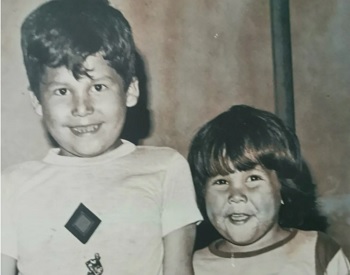
Kids in Elsipogtog sponsored to play hockey in honour of late fisherman, ‘Our Jumbo’
Captain Craig (Jumbo) Sock was a hockey defenceman and lifelong hockey fan, his favourite team being the Chicago Blackhawks. So when fellow fisherman Joshua Noel Millea decided to do something to honour his friend, who is believed to have died when his fishing boat capsized last year, it only made sense to incorporate hockey. “In memory of my brother man Jumbo … I would like to sponsor one kid for the upcoming hockey season,” >click to read< 08:42

Hitting the Lottery! A small New Brunswick town scores its 2nd big win
A retired crab fisherman won a jackpot online prize of $644,000, making him the second person from Le Goulet, N.B., to win a money prize. In early August, another retired fisherman from the same village won $1 million while playing Lotto 6/49. In a release Monday, Atlantic Lottery said Louis Mallet won a jackpot of $644,380 after he entered his Jackpot Scratch’N Win tickets into Atlantic Lottery’s 2Chance contest website. >click to read< 18:18
Lobster Fisherman is New Brunswick’s newest Millionaire – Atlantic Lottery says Clovis Roussel heard someone in his community had won and found out it was him when he went to the store. >click to read<

Lobster Fisherman Is New Brunswick’s Newest Millionaire
Atlantic Lottery says Clovis Roussel heard someone in his community had won and found out it was him when he went to the store. Roussel says his five children are also in the lobster fishery and one of his sons couldn’t believe he was a winner. “I walked in and told my son that I was going to buy myself a new truck and pay for it in cash,” Roussel said. “He didn’t believe me, so I told him it was because I had won $1million.” “’You’re lying,’ he says! Congratulations, Clovis! >click to read< 10:31






